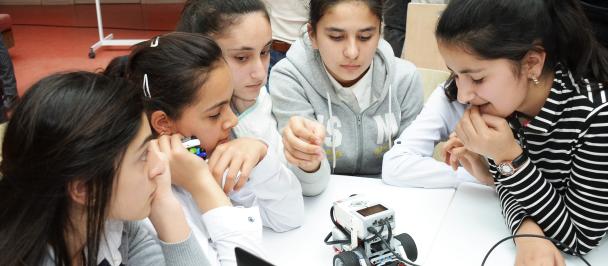- CHECK AGAINST DELIVERY -
Good morning ladies and gentlemen and distinguished guests. Let me start by thanking the Permanent Mission of Belarus, the Permanent Mission of Kazakhstan, project Chernobyl and the Russian American Foundation for inviting me to speak at this event on behalf of UNDP.
Needles to say that we all agree that nuclear disasters such as Chernobyl should never occur. At the same time, it is encouraging to see the world community come together to learn from such catastrophes. I therefore hope that the combined knowledge, accumulated over decades of work in this field, has increased the world’s preparedness to nuclear disaster.
Thirty-three years after the accident in Chernobyl, many people are still suffering. The accident’s disastrous human consequences and impact on the regional economy are still evident.
Of course, many international organizations and countries responded with generous and dedicated support. Several UN agencies were involved from the moment the accident happened, working to contain the radiation and helping communities to recover in the aftermath.
The UN in action
The UN has been working in unison, “delivering as one”, as we often put it, to bring normalcy to people on the ground.
For instance, the Administrator of UNDP was mandated by the U.N. General Assembly to coordinate international efforts on Chernobyl. That function has brought unity, a deep sense of purpose and feeling of accomplishment to our work.
The UN Inter-Agency Task Force (IATF) on Chernobyl is another such example. UNDP has been chairing this group since 2004.
At the last task force meeting in April of this year, we heard testimonies from partners like the EU and EBRD, whose work ranges from environmental remediation to building the famous dome around the reactor.
The World Health Organization stressed the importance of multidisciplinary research to improve the health of clean-up crews. We also learned about the parallels between Chernobyl and Fukushima in that regard.
As for UNDP, we primarily focused on eliminating the stigma around Chernobyl, working to help communities get back on their feet, recover a sense of pride and contribute to reviving the local economy.
Our area-based development programme is comprehensive, looking at virtually all aspects of development - from health and other public services, to entrepreneurship and the diversification of the economy. It puts people in the driving seat as decision-makers, as community mobilizers and as a productive labor force.
Their empowerment goes hand in hand with the spirit of the Agenda 2030 for Sustainable Development and the promise of Leaving No One Behind. That spirit dictates that everyone, every group, every region has a right to reach its full potential.
In Belarus, UNDP, UNICEF, UNFPA, IOM, WHO and many others are now helping communities turn the page for good. Their programmes support tourism, the transition to green technologies, the inclusion of vulnerable groups in development, cross-border cooperation and the protection of ecosystems.
Our work there is paying off. There are 37,000 small businesses operating near the power plant, up from only 2,000 in 2002. Sixty per cent of Homiel’s produce - comprising meat, dairy products and handicraft – are exported to neighboring regions and countries while the region attracted $18 billion worth of domestic and foreign Investment between 2011 and 2017, representing just over 15 percent of the country’s total direct investment during that period.
In Ukraine, UNDP, UNICEF, UN Environment, IAEA, WHO and others are working with communities and the government to boost the economy, improve health and education, but also to reduce exposure to radiation while managing future potential risks.
Thanks to these efforts, 4,000 local development projects originated by over 2,000 community organizations have increased the quality of life of more than 7 million people. Thousands of local residents, community leaders and doctors have also been trained on health risks and how to promote healthy lifestyles around them.
So, what conclusions can we draw from Chernobyl and other nuclear accidents? First and most important of all: the focus of the international community has moved away from a response mindset to include prevention, preparedness, recovery and rehabilitation.
This is why it is so important to understand multiple types of disasters and how to reduce their consequences from all angles and sectors.
Because unfortunately, man-made disasters or climate related catastrophes can and do happen anywhere.
Inaugurated in 2015, the Sendai Framework for Disaster Risk Reduction came from the conclusion that preparedness can help prevent the worst and speed up the response.
In the case of Chernobyl, communities were informed very late of what happened and this had serious consequences. Thus, our lesson must be: invest in early warning systems, strengthen models to assess the potential impact of disasters on different sectors. And above all, put people at the center of all prevention and preparedness efforts.
The road ahead
Let me conclude by saying that this year, the U.N. Secretary-General will report on Chernobyl activities at the 74th Session of the General Assembly. This report will serve as a basis for a new GA resolution on Chernobyl which will outline the U.N.’s approach for the support to the affected region.
Ladies and Gentlemen, dear colleagues,
The Chernobyl accident occurred in April 1986 and we must be aware and humbled to see that its legacy still persists, uniting so many local, national and international partners who work hard to learn from the past and to build a more sustainable future for the people of Belarus and Ukraine. But above all, I would like to pay tribute to the communities who forge ahead in the face of tragedy and stigma. Their struggle and resilience is a lesson for the international community to prevent at all cost such man-made disasters from happening again.
Ladies and gentlemen, I thank you for your attention.

 Locations
Locations



